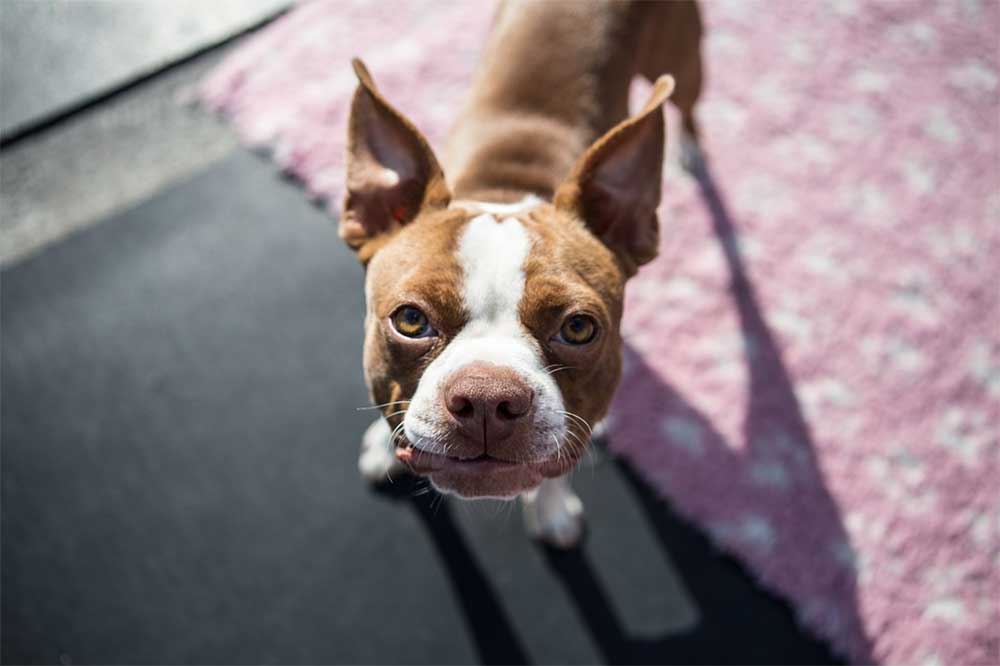
Boston Terriers can have sensitive stomachs and food intolerances just like any other dog breed. Even if a dog has no outright intolerance of certain foods, there are things that’ll make your Terrier itchy and gassy too.
The sensitivity of a Terrier’s stomach can vary depending on the specific pet and their parentage. The surest way to determine if your dog has a sensitive stomach is to take them to the veterinarian and discuss any dietary changes that you want to make.
Food allergies can develop in Boston Terriers suddenly, even if the dog has eaten the problem food for a while with no problems at all. If you see your dog have any of the symptoms associated with a sensitive stomach, make a note of everything they have eaten and stop feeding them the food that triggered it.
Also, stay away from the following foods for Boston Terriers as they are toxic:
- Onions
- Garlic
- Avocados
- Alcohol
- Coffee
- Grapes
- Gum
- Chocolate and dairy products
Are Eggs Good For Boston Terriers?
Eggs should be safe for your Boston Terrier if they’re given as a treat and not provided as a regular meal. The eggs must be cooked since raw eggs are dangerous for consumption by dogs, including Boston Terriers.
Eggs are a superfood that is dense with calories, so you can’t give them too many. If you do, you risk making your Boston Terrier obese which comes with a raft of health issues.
As always, you need to talk to your veterinarian about adding eggs to the dog’s diet. If you get the green light, the best way to feed your Boston Terrier eggs is to boil them and cut the egg into pieces after removing the shell. You can also scramble it.
The most important part is that your dog should be given small chunks. Half of an egg a day should be the maximum amount they are given, and then you can take a day off before giving them an egg again.
Can Boston Terriers Eat Bacon?
Bacon is a favorite in many people’s homes, but can your Boston Terrier join in on the fun? Unfortunately, not! Pork meats are typically a no-no for dogs. Whether that’s pork cuts, bacon, or ham, they’re all tough, fatty, and have enough salt content to cause a problem in your Terrier’s stomach.
If fed with enough of these meats, your dog can develop pancreatitis which proves fatal for many dogs.
Salty meats can also cause your dog to become thirsty. This causes bloat, which is where a dog’s stomach fills up with something to make it expand. This can be food or gas but, in this case, it’ll be fluid as your dog drinks because its mouth will feel dry.
To fight dehydration, your dog could drink too much and develop bloat, which can debilitate or even kill your dog.

Can Boston Terriers Eat Chicken?
Dogs are carnivorous, even your cute Boston Terrier, so there are some meats that they can eat. These are particularly lean meats which include some types of beef, turkey, and yes, chicken.
Some of these meats are already present in the wet dog foods you can buy for your dog, so it’s self-evident that chicken can be consumed by your dog.
Lean meats contain a lot of the good proteins and fats that give your dog a lot of energy. Of course, there are still some concerns with dogs. Avoid processed meats, try to keep any lean meat fresh when you feed it to your dog.
Watch out for small bones in any chicken that you give to your pet, if you wouldn’t eat it yourself for fear of bones then you shouldn’t feed it to the dog. Small bones have the potential to choke a Boston Terrier.
You can also feed your dog chicken feet and gizzards if they’re an adult. The firmness of the feet is great for promoting dental health.
Needless to say, the small jaws of Boston Terriers need to have food fed to them in bite-size pieces so their mouths and their stomachs can handle it.
What Is The Best Dog Food For Boston Terriers?
Boston Terriers benefit from hard food more than a lot of the other dog breeds. Hard foods strengthen the teeth of your dog, rubbing away plaque and preventing cavities that might otherwise develop if you feed the Terrier an unchallenging soft diet.
Their stomachs are well-equipped to digest hard foods and it should make up the majority of their diet. You’re spoilt for choice when it comes to popular dog food suppliers who provide quality dry dog food.
It’s common for Terriers to get gassy when fed corn and other canned foods that may contain wheat. If that’s a problem with your animal, then try to stay away from those foods. Lean meats are better for energy. Non-meat alternatives can include small portions of potatoes too.
Along with their typical food, they should have water accessible at all times and especially during the summer months. This helps them stay hydrated and cool off.
What Is The Best Food To Feed A Boston Terrier Puppy?
Puppies require a nutrient-focused diet, no matter the breed. Boston Terriers have a big appetite for their size, so let’s cover some of the ideal food types for these puppies.
They’ll need a lot of protein. Chicken is a great source of protein but, barring that, broccoli and eggs are a great source of protein when given in small chunks.
Avoid grains as they’ll give your dog gas. Look for grains on the labels of dog food and avoid the ones with the most grain content. The dog food should be a mix of dry and wet food so your puppy reaps the benefits of both.
The Terrier should stay away from sugary foods too while their digestive system is developing.
Lastly, always be on the lookout for allergies forming in your Boston Terrier puppy. You can’t predict which ones to avoid, just keep an eye out for rashes, itching, hair loss, gassiness, and diarrhea.
